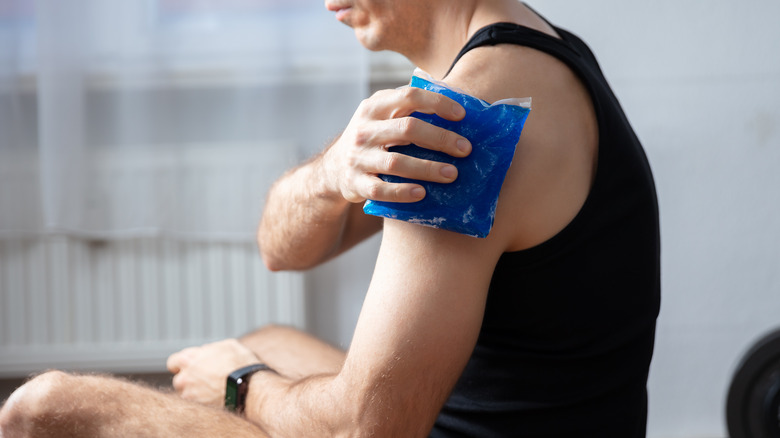Why Running Is Hurting Your Shoulders
Experiencing shoulder pain while running is quite common. Physical therapist Elizabeth Lamontagne told Runner's World that around 50% of her patients are runners who complain of shoulder pain. Sports medicine specialist Ramon Julian M. Pesigan explains that the muscles used in running are not solely located in the legs. In fact, the activity utilizes a wide range of muscle groups, including the upper back, neck, and shoulders. These upper body muscles are prone to injury depending on a variety of factors.
There are several reasons why you might be feeling sore in your shoulders when you go for a run (via Runner's World). The first is simply that you're new to running or returning to the sport after taking some time off. In this case, you may find that the exercise takes a toll on your muscles. Another common reason is that your upper body is lacking in strength, causing you to run with poor posture or move your arms in an unnatural way. If your arms aren't swinging correctly when you run, this can also cause soreness or even injury to the shoulder muscles. One more contributor to shoulder pain is tensing the muscles in your upper body or keeping your shoulders hunched when you run.
A 2014 study in the International Journal of Sports Physical Therapy found a link between shoulder pain and balance deficiency, pointing to yet another potential cause of soreness while running. Having a stable and balanced core is positively correlated with proper shoulder function.
How to treat and prevent shoulder pain
If you experience shoulder pain while running, you shouldn't ignore it. There are multiple ways to treat shoulder soreness depending on the underlying factors contributing to the condition. Certified exercise physiologist DeAnne Davis Brooks told Runner's World that anyone experiencing general soreness should plan on icing the area for around 20 minutes at a time, repeating every couple of hours as needed.
When your shoulder soreness is due to an incorrect arm swing, exercise physiologist Dean Somerset recommends stretching the deltoid and trap muscles to alleviate pain (via Runner's World). To carry out this stretch, put one arm behind your back and pull down on it with the other while leaning your head to the opposite side. If you notice that your upper body strength is weak, work on incorporating strength-training exercises into your workout regimen. The specific muscles you want to target are the triceps, biceps, rotator cuffs, neck muscles, and deltoids. It is also important to adjust the intensity of your training until you've worked up enough strength in your upper body.
The University of Pittsburgh Medical Center offers a few additional suggestions for preventing shoulder pain. Before your run, make sure you warm up your muscles properly. You should also spend some time stretching at the end of every run. During your run, focus on breathing correctly and maintaining proper posture. It can also be helpful to check in with your body and relax any tense muscles throughout your workout.


